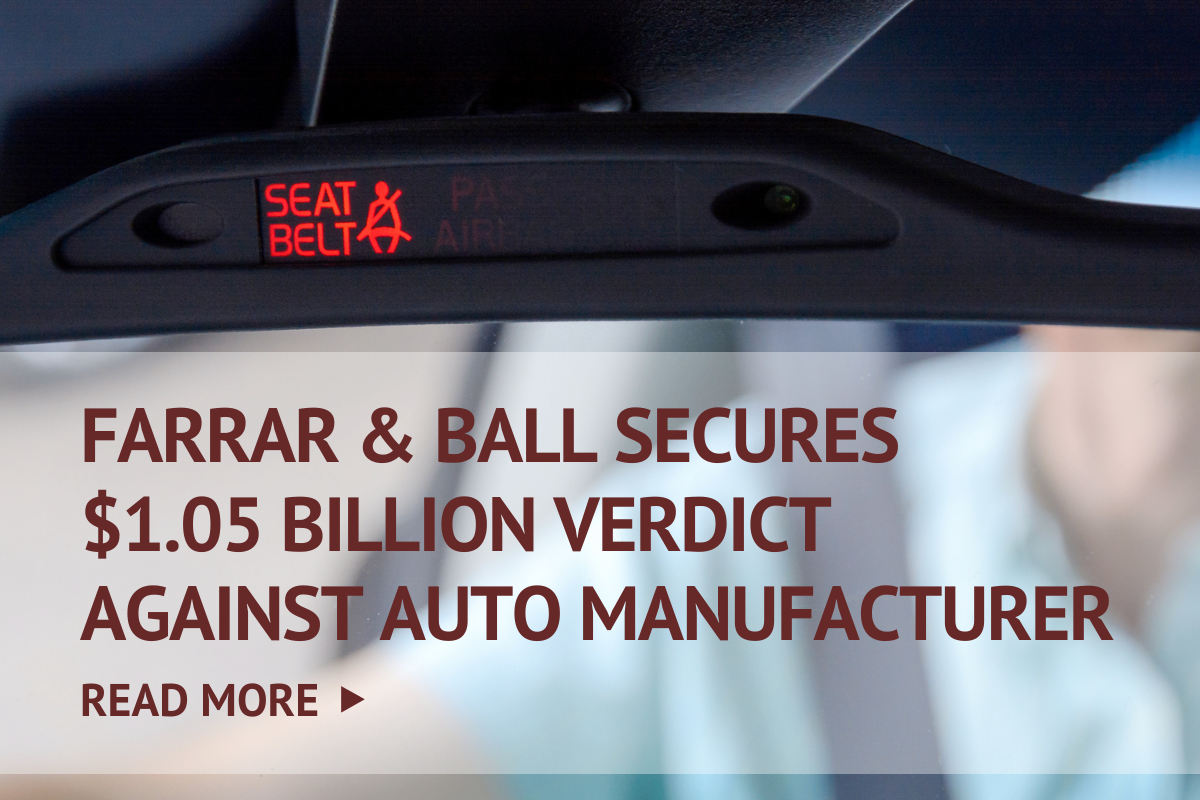A $3.08 million tire defect verdict won by trial lawyers from Kaster, Lynch, Farrar & Ball has caught the attention of numerous transportation and legal publications.
The Legal Intelligencer describes how the Pittsburgh jury’s unanimous verdict on September 29 hinged on the concept of “consumer expectation” – that products come with an expectation that they will not cause harm.
Writes the Legal Intelligencer:
Following a two-week trial involving expert testimony on the various aspects of a tire’s design and manufacturing, the jury’s Wednesday decision came down to the less technical matter of a consumer expectation test, which found that the product that caused the plaintiff’s injury did not perform as safely as its user reasonably assumed it would.
The trial addressed the liability of Kumho Tires USA in a 2014 trucking accident that left driver Milford Stevens with a number of bodily and neurological injuries. Stevens had been driving a dump truck on a public roadway when one of the truck’s KTUSA-manufactured tires peeled apart and caused Stevens to lose control of and crash the vehicle. A police report found that the failed tire was the primary cause of the accident.
The defense sought to prevent the plaintiffs from using the consumer expectation method of proof, both through a motion for summary judgment and a motion in limine. In its pretrial statement, it argued that “the mere presence of plaintiff’s expert opinion precludes application of the consumer expectation theory.”
Lead trial counsel Wesley Ball of Farrar & Ball, however, said, “I really believe that what the expert does is nothing more than really color what the jury already is going to have an understanding of.”
Writes Tire Business magazine:
The plaintiff, Milford Stevens, sued Good Tire Service Inc. of Altoona, Pa., after suffering serious neurological and physical injuries, including fractures to his vertebrae, head and face, in the September 2014 accident. Mr. Milford’s attorneys claim the tire, a Kumho Powerfleet 983, experienced a sudden tread failure, causing his fully loaded dump truck to crash and roll over.
Mr. Stevens was driving a 2007 Mack tri-axle dump truck, owned by Thomas Construction and loaded with over 72,000 pounds of sand, at highway speeds on U.S. 422 near Muddy Creek Township, Pa., according to the suit.
According to testimony in the case, the tread on the Kumho Powerfleet 983 tire, mounted on the vehicle’s left front wheel position, separated, causing Mr. Stevens to lose control.
During two weeks of trial testimony, trial lawyers Wes Ball and Skip Lynch of Kaster, Lynch, Farrar & Ball presented evidence they claim showed the tire was defective in design and should not have been placed on the market.
Among other things, the attorneys presented evidence they claim showed that the rubber compound around the tire’s belts had insufficient antioxidant content, which they contended would have prevented the tire from premature failure due to oxidation issues.
Mr. Ball accused Kumho Tire USA of being “driven by profit rather than safety.”
“Bad designs cause bad problems,” he said. “Companies like this shouldn’t be allowed to benefit from our system of trade while disregarding the safety of our citizens.”
Notes Law360:
As a result of the accident, Stevens suffered serious injuries, including fractures to his vertebrae, head and face, according to the suit. Stevens’ attorneys presented evidence at trial showing that the tire did not have adequate protection to prevent tire failure from oxidation, according to the release.
Sherry said the jury found that the tire was defective in its design, and not because of a manufacturing defect, and awarded Stevens approximately $256,000 for past medical expenses, $554,000 for his future life care plan, and $400,000 for past and future loss of household services, plus $1.8 million in noneconomic damages.



